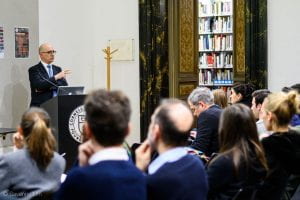Blogger: Joseph Reigle
Photos: Savanna Lim


Last Thursday, we were delighted to host our first guest lecturer Stefano Siviero. Siviero is an economist who has worked for the Bank of Italy. In 2007 Siviero was appointed Head of the Modelling and Forecasting Division. And in 2013, he became Head of the Economic Outlook and Monetary Policy Directorate. But perhaps his highest honor is being a longtime friend of our city planning professor, Nancy Brooks, with whom he shares an alma mater, University of Pennsylvania.
Siverio’s lecture, entitled “Italy in the Eurozone: A Tale of Two Countries?” described how Italy has responded to the great financial crisis and the sovereign debt crisis, which both hit the nation within ten years of the start of the euro.
Before the two financial crises, the Italian economy faced several weaknesses. Exports lagged behind demand, economic growth was steadily declining, and competitiveness was quickly being lost in an increasingly aggressive global environment.
However, over the last decade, some conditions have improved compared to their pre-financial crisis status. Exports are matching the increase in foreign demand, and the flow of non-profit loans has improved. But other issues remain open. Productivity is still low, and the GDP is not growing fast enough to pay off the national debt.
Several factors make working with the euro complicated. The rules that govern how countries can use the euro are challenging to understand and can easily be maneuvered around through several escape clauses. There is a low political cost of deviation from the rules, and adding more rules would likely result in more exceptions.
Siviero ended with three conclusions. Italy needs fiscal capacity. The country needs to be aware awareness of how changes in the national economy will impact other countries in the eurozone. And fiscal union for the euro area is a medium to long-run project.
